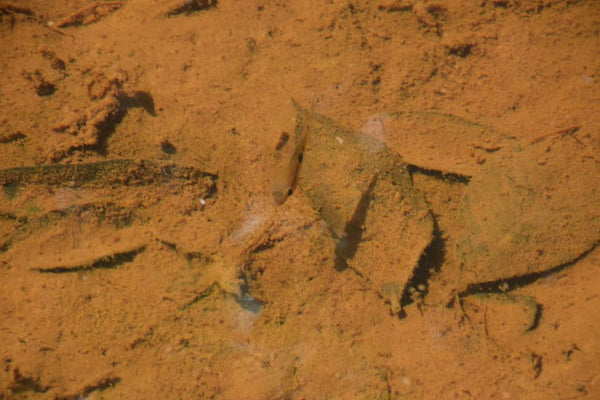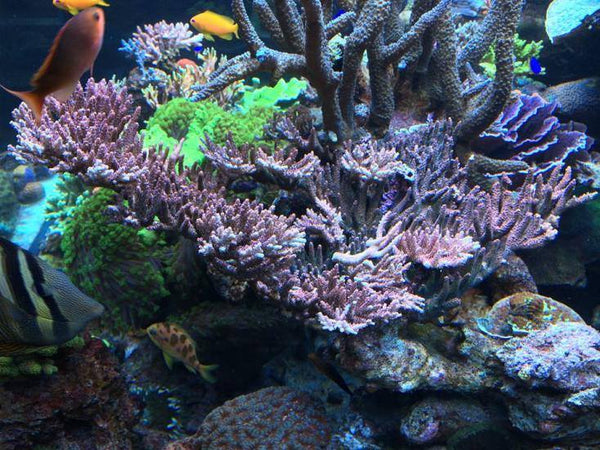- Continue Shopping
- Your Cart is Empty
Are we just full of...detritus?
"detritus is dead particulate organic matter. It typically includes the bodies or fragments of dead organisms, as well as fecal material. Detritus is typically colonized by communities of microorganisms which act to decompose or remineralize the material." (Source: The Aquarium Wiki)
Woah!
It's one of our most commonly used aquarium terms...and one which, well, quite frankly, sends shivers down the spine of many aquarium hobbyists. And judging from that definition, it sounds like something you absolutely want to avoid having in your system at all costs. I mean, "dead organisms" and "fecal material" is not everyone's idea of a good time, ya know?
Yet, when you really think about it, "detritus" is an important part of the aquatic ecosystem, providing "fuel" for microorganisms and fungi at the base of the food chain in tropical streams. In fact, in natural blackwater systems, the food inputs into the water are channeled by decomposers, like fungi, which act upon leaves and other organic materials in the water to break them down.

And the leaf litter "community" of fishes, insects, fungi, and microorganisms is really important to these systems, as it assimilates terrestrial material into the blackwater aquatic system, and acts to reduce the loss of nutrients to the forest which would inevitably occur if all the material which fell into the streams was washed downstream!

That sounds all well and good and grandiose, but what are the implications of these processes- and the resultant detritus- for the closed aquarium system?
Well first off, let's admit that the stuff just doesn't look that nice to most of us, and that's partially why the recommendation for a good part of the century or so we've kept aquariums is to siphon it the hell out! And that's good advice from an aesthetic standpoint- and for that matter, from a husbandry standpoint, as well. Excessive amounts of accumulating waste materials can lead to increased phosphate, nitrate, and other problems, including blooms of nuisance algae. Emphasis on the word "excessive" here...(which begs the question, "What is "excessive" in this context, anyways?)

Most hobbyists don't have the time, inclination, or optimized system set up to take advantage of a small accumulation of this stuff. However, with the importance of detritus in creating food webs in wild leaf litter communities, which we are now replicating in aquariums, could there actually be some benefit to allowing a little of this stuff to accumulate? Or at least, not "freaking out" and removing every single microgram of detritus as soon as it appears?
I think so. Really.
Is this another one of those long-held "aquarium truisms" that, for 90% of what we do is absolutely the correct way to manage our tanks, but which, for a small percentage of aquarists with the means, curiosity and inclination to experiment, could actually prove detrimental in some way?

Okay, I know that now a bunch of you are thinking, "This guy IS nuts. Letting detritus accumulate in an aquarium is bad news. A recipe for problems- or worse. And not only that, he has no idea of the implications of what he's suggesting."
Well, as far as the first part of your thought- Yeah, I could be a bit "crazy." On the other hand, I think I do have some idea of the implications of what I'm postulating here. First off, remember, I'm not suggesting that everyone throw away their siphons and just allow shit (literally!) to accumulate in their aquarium substrate in the interest of creating a "food web."
No sir.
What I am curious about is if there is some benefit in a botanical, blackwater system, of encouraging a bit more fungal and microbial growth, utilizing, among other things, the organic detritus that inevitably is produced in a well-managed. well-populated aquarium. I mean, if you're doing water changes and removing uneaten food, dead fishes, aquatic plant leaves, etc., you're already significantly reducing the "food inputs" available to the organisms on the low end of the food chain, right? In a typical aquarium, well-maintained with regular water changes and removal of detritus, our fishes are almost 100% dependent upon us to provide food, right?

There's usually very little for them to forage on in most aquariums, other than the occasional algal film (assuming they're herbivorous) or particle of uneaten food. Creating militant, "near sterility" in our aquariums, which do at least superficially resemble true ecosystems, might actually be detrimental in some way, right? I mean, you're removing one component of a natural cycle and replacing it with a high-octane, "shotgun approach" substitute of just taking everything out.

Can it be said that this actually Creates, perhaps (?) an unnecessary "dependency" of sorts on this human intervention, right? At the very least, are we actually making the management of aquariums more challenging by sort of "fighting" nature, and simply not thinking this through all the way? Doesn't nature, if left to her own devices, tend to keep excesses of all sorts more-or-less in check?

I'm not suggesting to abandon all husbandry practices, of course. Just suggesting we think about the "hows and whys" just a bit more...perhaps with a different viewpoint.
So, perhaps- maybe- Is there just some merit in the idea of leaving a bit of detritus in the system- say, in the leaf litter bed, to help "fuel" the fungal and microorganism growth that forms the basis of our little ecosystems? I mean, think of some possible benefits to our aquariums. Having a more complete assortment of fungi and microorganisms could lead ultimately to a more stable, more efficient aquarium, right?

If you're not wiping out a percentage of the ecosystem's primary decomposers and food sources weekly with ultra-intense maintenance, wouldn't there perhaps be some advantages? And don't a lot of young fishes consume "infusoria" as a part of their initial diet? Wouldn't it make sense to have larger populations of some of these organisms available to our fishes at all times in the aquarium to supplement our artificial diets? Could the fry-rearing system of the future be a tank with a big bed of decomposing leaf litter and a terrestrial soil substrate?

At some future point, perhaps we will have more commonly available laboratory pure cultures of aquatic insects and crustaceans which help break down leaves, botanicals, and organic detritus into more manageable forms for the fungi and bacteria to further process. Perhaps the basis of a more complete "food chain" in our aquariums? The concept of a freshwater refugium once again rears its head! Seems like I talk about this every other week, huh? It's something we've toyed with in reef aquariums for some time now, and the benefits have been quite tangible.

In a similar, perhaps more relatable vein- here's a question: Why do we add fertilizers to grow aquatic plants? Is it because closed systems simply tend to be deficient in the substances plants use for growth, or that we tend to dilute/reduce them through some excess intervention...or? Okay, I Might be reaching with that one.... Here's a better question:
Why are very "rich" substrates (and "dirted tanks") proving to be so beneficial for many plants, yet we would never think of using soil, etc. as a substrate for aquariums that don't cater specifically to plants...or should we?

Is there some advantage to allowing our aquariums to harbor a greater diversity and population of life forms, in order to have a more complete "functional capability?" Is this the road to an out-of-control over-populated closed system? DO we dare experiment? Or, is it simply more advantageous to buy that new, high-powered canister filter that holds six liters of carbon, and create pristine, "drinking-water quality" conditions in the tank and call it a day?

Okay, my ignorance is undoubtedly showing through, but I think these are interesting questions to ponder as we debate the merits of managing botanical systems just a bit differently, perhaps? I don't have the answers, but there is some benefit in asking the questions, right? Would love for some of our fans who are trained biologists or chemists to chew on this stuff a bit more. In context, I think there is as much to be learned by simply pondering the questions as there might be by changing our practices and methods.
As usual, my little rambling discussion leads to more questions than answers. However, some of these questions- which address some of the most fundamental, long-held beliefs and practices in aquarium-keeping, might help us make not only more "mental shifts", but true breakthroughs as we rediscovery the utility of the elegant, yet "complex simplicity" that nature has engineered over the eons.
Embracing- not fighting- nature in a more complete sense just might be "the next big breakthrough" in aquarium keeping.

Ask those questions. Look for those answers. Dare to question. Conduct those experiments.
Stay bold. Stay curious. Stay persistent. Stay confident.
And Stay Wet.
Scott Fellman
Tannin Aquatics
2 Responses
Josh Coleman
I enjoyed your writing and thinking. The pictures are also very nice.
Garrett
Something that perturbs more than a few people who look at my blackwater tanks is the question: “How do you vacuum your substrate? I mean, it’s mostly disintegrated leaves and coconut fiber.” And my answer is quite simple: I don’t!
In the interest of keeping it simple, I let everything be. There are a few key components though. Understocking fish. Feeding smaller amounts more frequently. Including small crustaceans including the dreaded bladder, ramshorn and trumpet snails to go through waste and disrupt the substrate to process it further. Including a variety of plants, including floaters and algae, to act as nutrient sinks in their own unique capacities. And, of course, a weekly 10%-25% water change performed religiously on schedule, more or less.
It works, and it has been working for months now in at least one of my tanks. Blooms of copeopods and worms happen regularly. Recently, I even switched to spongeless filtration, relying on biomedia to do my beneficial bacteria work and letting the bigger chunks of detritus waft through the filter to be redistributed throughout the tank, and so far it has been going very well – I will also say that filter maintenance has gone wayyyy down!
So be bold! It’s okay to let the shit pile up… just keep one eye on how your fish are doing.









Sanjay Ghataode
Author